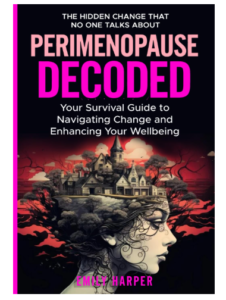Perimenopause is the phase leading up to menopause where women experience significant hormonal changes, particularly a drop in estrogen levels. This transition can be a bit of a rollercoaster ride, impacting both the body and mind.

Biologically speaking, as women approach menopause, their ovaries gradually produce less estrogen, leading to various changes. These hormonal shifts can cause irregular periods, hot flushes, mood swings and a host of other symptoms. Understanding these changes is critical to managing them effectively and prioritizing health and wellness.
The end of perimenopause is marked by menopause itself, which occurs after a woman has gone a full 12 months without a menstrual period. This marks the official “end” of perimenopause, although symptoms and adjustments to the “new normal” may continue for some time.
Recognizing and Managing Common Symptoms of Perimenopause
Experiencing irregular periods is often one of the first signs that you’re entering perimenopause. These changes can be unpredictable, sometimes shorter, longer, heavier, or lighter, making it challenging to anticipate the next cycle.
Hot flushes and their nighttime companions, night sweats, can become frequent guests. While inconvenient, there are coping strategies—layered clothing, breathable fabrics, or fans at the bedside—that can offer relief.
Mood swings are another hallmark of this time. It’s crucial to recognize and address these emotional shifts. Whether through talking to a friend, getting outside, or even seeking professional support, there are ways to keep emotions in check.
Vaginal dryness can be unexpected and uncomfortable. Over-the-counter lubricants or moisturizers can ease discomfort and make intimacy more pleasant during this period.
Low libido often accompanies hormonal changes. Open communication with partners and exploring new ways to connect can help maintain intimacy during perimenopause.
Sleep problems can leave you feeling exhausted. Establishing a calming bedtime routine and creating a comfortable sleep environment can improve rest. If night sweats persist, opting for moisture-wicking sheets (these sheets are typically made from synthetic fibers, such as polyester, or natural materials like bamboo or certain types of cotton that have moisture-wicking properties) or pajamas might make nighttime disruptions less frequent.
Lastly, don’t overlook urinary issues. The trip to the bathroom becomes frequent, or you might experience urgency more often. Caffeine, alcohol, and spicy foods can exacerbate these symptoms, so be mindful of your diet and fluid intake.
Making Lifestyle Changes During Perimenopause
Crafting a healthy lifestyle is one of the best defenses against the more jarring symptoms of perimenopause. It often starts with a healthy diet and what you put on your plate. Eating a diet rich in calcium, vitamin D, and phytoestrogens is key to supporting hormonal balance. Adding foods like salmon, leafy greens, and tofu can make a real difference.

Regular exercise is another powerhouse when it comes to managing perimenopausal changes. Staying active helps maintain a healthy weight, boosts your mood, and strengthens bones. Whether it’s yoga, walking, or weight training, finding an activity you love can keep you motivated.

Stress is a colossal disruptor during this time. Techniques like mindfulness and meditation can be instrumental in grounding yourself and maintaining emotional well-being. Even a few minutes a day dedicated to these practices can offer significant relief.
Read more about mindfulness and meditation here.
Good sleep hygiene is worth its weight in gold. This means setting a regular bedtime, avoiding screens right before sleep, and creating a calming pre-sleep routine. These steps can make nights smoother and days more energetic.
When it comes to more severe symptoms, exploring medical treatments like Hormone Replacement Therapy (HRT) might be beneficial. Consulting a healthcare provider ensures personalized advice that aligns with your health needs and lifestyle choices.
Challenges and Risks: What to Avoid During Perimenopause
During perimenopause, it’s essential to be mindful of habits and substances that might exacerbate symptoms or increase health risks. Smoking tops the list of things to avoid, not just for its general health impacts but because it can worsen hot flushes and speed up the onset of menopause.
Next, drinking alcohol and indulging in too much caffeine may impact sleep and magnify anxiety or mood swings. Moderation is key here if you still want to enjoy that glass of wine or cup of coffee without side effects.
Weight management becomes more challenging during perimenopause as metabolism tends to slow. Staying active with regular exercise and focusing on a balanced diet can help stave off unwanted pounds. Focus on whole foods and watch portion sizes to keep things in check.
The risk of osteoporosis climbs as estrogen levels drop, so keeping bones strong is crucial. Regular strength-bearing exercises and a diet rich in calcium and vitamin D are effective strategies.
Although pregnancy becomes less likely, it’s still possible until menopause is confirmed. Discussing contraceptive options with your doctor can prevent surprises and allow you to plan intentionally.
Contraception like the Mirena might reduce perimenopausal symptoms but won’t eliminate them entirely as perimenopause is as a result of a decrease in estrogen and the Mirena does not affect estrogen.
Finally, staying proactive with health check-ups and addressing symptoms can lead to a smoother transition. Don’t hesitate to reach out to healthcare providers for ongoing support and guidance through this transformative phase.
A book that I’d highly recommend reading is Perimenopause Decoded: Your Survival Guide to Navigating Change and Embracing Your Wellbeing. Get it from Amazon here.

Read more about essential self-care tips during Perimenopause here.
Read about Perimenopause and Mental Health here.
Read about Natural Treatments for Perimenopause Symptoms.
Read about Understanding HRT: Is it right for Perimenopause?
Get your complete, expert, evidence-based guide to perimenopause and menopause here.
Here’s a little transparency: Our website contains affiliate links. This means if you click and make a purchase, we may receive a small commission. Don’t worry, there’s no extra cost to you. It’s a simple way you can support our mission to bring you quality content.
🌿 Navigating Perimenopause with WelleCo – Balance, Energy & Vitality! ✨
Perimenopause can bring hormonal fluctuations, fatigue, brain fog, and sleep disruptions, but the right nutrition can make all the difference! WelleCo’s premium, plant-based supplements—like the Super Elixir™ and The Goddess Elixir—are designed to support hormonal balance, energy, gut health, and glowing skin from the inside out.
Take control of your well-being and feel your best at every stage! 🌸💪 Discover how WelleCo can help you thrive through perimenopause. Click on the image below.👇
